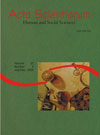<b>Simulacro e negatividade: a intertextualidade de <em>Em Busca de Curitiba Perdida</em>, de Dalton Trevis</b> - DOI: 10.4025/actascihumansoc.v28i1.179
Resumo
Os fenômenos culturais contemporâneos/pós -modernos caracterizam-se, freqüentemente, pelo diálogo irônic o e lúdico (intertextualidade) com a cultura passada e pr esente e pela problematização de projeções em relação ao futuro. Tais caracteres, não raro, configuram simulacros e/ou hiper-realidades, representações despojadas de referencialidade cujos temas são, muitas vezes, relativos às próprias representações. Nesse sentido, é notável o conto Em Busca de Curitiba Perdida, do paranaense Dalton Trevisan: por meio da intertextualidade com o roman-fleuve Em Busca do Tempo Perdido (À La Recherche du Temps Perdu ), do francês Marcel Proust, o texto de Trevisan coloca em xeque a utopia proustiana de união entre arte e vida, criando um simulacro cuja viabilidade se dá, paradoxalmente, por meio de sua própria impotência.Downloads
DECLARAÇÃO DE ORIGINALIDADE E DIREITOS AUTORAIS
Declaro que o presente artigo é original, não tendo sido submetido à publicação em qualquer outro periódico nacional ou internacional, quer seja em parte ou em sua totalidade.
Os direitos autorais pertencem exclusivamente aos autores. Os direitos de licenciamento utilizados pelo periódico é a licença Creative Commons Attribution 4.0 (CC BY 4.0): são permitidos o acompartilhamento (cópia e distribuição do material em qualqer meio ou formato) e adaptação (remix, transformação e criação de material a partir do conteúdo assim licenciado para quaisquer fins, inclusive comerciais.
Recomenda-se a leitura desse link para maiores informações sobre o tema: fornecimento de créditos e referências de forma correta, entre outros detalhes cruciais para uso adequado do material licenciado.


























